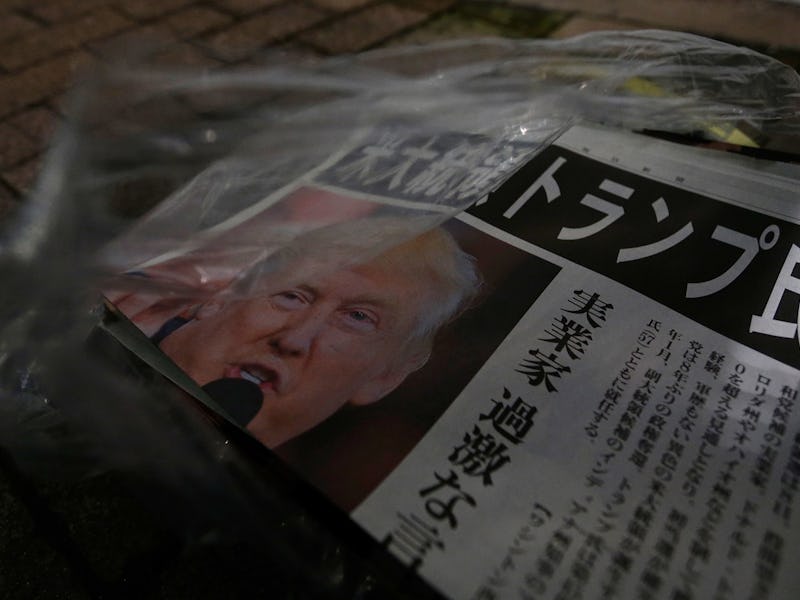How a Trump Presidency Might Affect Your Favorite Anime
"Kore wa warui desu." In English, "This shit is bad."

On November 17, Japanese Prime Minister Shinzo Abe made an urgent trip to New York to speak with President-elect Donald Trump about Japan’s relationship with the United States. If Trump actually follows through with the promises that he made during his campaign, then the United States’ relationship with Japan can possibly be at its worst point since the end of World War II. That means a lot for the rest of the world, but it means something specific for non-Japanese anime fans.
Originally, Trump made several promises to lessen the U.S. military presence in Japan, arguing that we spend too much money in the region despite Japan fronting 75% of the cost to maintain American bases. He has also suggested that both Japan and South Korea get their own nuclear weapons to defend themselves against the North Korean threat in the area even though Japan is adamantly against the use of nuclear weapons. Most notably, he plans to end the Trans Pacific Partnership, a multilateral trade agreement intended to bolster the economies of the United States, Japan, and several other countries. So, what does all of this have to do with anime? Quite a lot, actually.
NEW YORK, NY - NOVEMBER 17: Prime Minister of Japan Shinzo Abe speaks to reporters following a meeting with President-elect Donald Trump November 17, 2016 in New York City. Trump and his transition team are in the process of filling cabinet and other high level positions for the new administration. (Photo by Drew Angerer/Getty Images)
Anime is one of Japan’s main cultural exports and as such, will be affected by changes to international trade As consumers of this genre, our watching habits will be severely impacted in the next four years. If Trump follows through on his promises, it will alter the power of Japanese currency and affect the flow of money within the country. As something that is managed by private companies, changes in the amount of and power of Japanese currency will end up affecting Japanese markets, and not for the better. The anime industry can take a huge hit and alter our anime watching patterns for the foreseeable future.
Although it may seem farfetched, past evidence shows that when the economy is doing poorly, then the anime industry also doesn’t do well. Anime took a huge hit in 2008 when the market crashed. In 2005, the anime market pulled in 521.5 billion yen according to a survey conducted by the Association of Japanese Animations. In 2009, that number dropped to 254.4 billion yen, a 48% drop in total money acquired from anime. The revenue has risen since that time, reaching 326.5 billion yen in 2014.
Calculated by Mr. Yuji Mori based on the survey conducted Association of Japanese Animations
It’s important to remember here that anime is a luxury item. When people have more disposable income to spend on anime and associated fandom memorabilia, the market will obviously flourish. Knowing this and how important anime is to Japan’s representation, anime is embedded into the Japanese market. Japan uses characters and animation in many of its marketing campaigns. Programs with a large amount of foreign marketability, like Attack on Titan or One Piece, helped to revitalize the anime industry after the market crash in 2008.
NEW YORK, NY - NOVEMBER 17: A view of the stage setup following Prime Minister of Japan Shinzo Abe's press conference following a meeting with President-elect Donald Trump, November 17, 2016 in New York City. Trump and his transition team are in the process of filling cabinet and other high level positions for the new administration. (Photo by Drew Angerer/Getty Images)
When the Japanese economy is in trouble, animators aren’t as likely to experiment with new projects. A sluggish economy leads to low wages, long hours, and an overall decrease in the number of individuals who are willing to work in the industry. Animators then produce content solely marketed to dependable niche audiences in an attempt to generate enough revenue for their employees. In other words, we get a lot of anime that appeals to a specific group instead of the wide array that we have.
Animation can often be outsourced to neighboring countries because producers pay less money to small production companies or outside sources. Therefore, the quality is lessened, the overall amount of anime is decreased, and stories tend to become tedious and boring as we are fed a specific brand of anime meant to satiate the same tastes over and over.
When you see your anime starting to switch up
UBS AG, a Swiss global financial services company, reported in November that although Yen traders seem to feel differently, the Yen will strengthen to 98 per dollar by this time next year. If that truly is the case, then it means good things for the Japanese market. But, Trump’s plans seem to signal the exact opposite.
A decline in military services for Japan, a backing of nuclear support, and the removal of a multilateral trade agreement, means that Japan will inevitably have to put money into other sectors to keep the country running. Japan could decide to a whole host of things in order to account for the changes and who knows what will happen if our relationship with Japan eventually deteriorates. We can try to remain positive, but if Trump loses quality anime for us, he will have a lot of angry otakus to contend with.